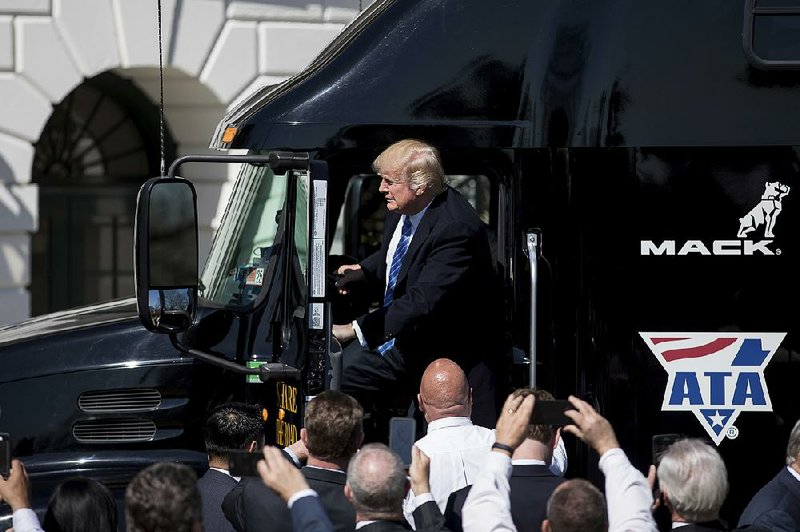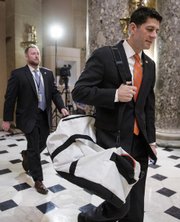WASHINGTON -- President Donald Trump on Thursday abandoned negotiations and demanded a make-or-break vote on proposed health care legislation in the House, threatening to leave the Patient Protection and Affordable Care Act in place and move on to other matters if today's vote fails.
The move was presented to GOP lawmakers in a private meeting Thursday night after a long and intense day that saw a planned vote on the health care bill scrapped as the proposal remained short of votes amid cascading negotiations among conservative lawmakers, moderates and others.
At the end of the day the president had had enough and was ready to vote and move on, whatever the result, Trump's budget director, Mick Mulvaney, told lawmakers.
"'Negotiations are over, we'd like to vote tomorrow and let's get this done for the American people.' That was it," Rep. Duncan Hunter of California said as he left the meeting, summarizing Mulvaney's message to lawmakers.
[INTERACTIVE: Compare new health care proposal with Affordable Care Act]
And if the vote fails, the Affordable Care Act "stays for now," Hunter said.
"Let's vote," White House chief strategist Steve Bannon said as he left the meeting.
The outcome of today's vote was uncertain. Both conservative and moderate lawmakers claimed the bill lacked votes after a long day of talks.
"It's done tomorrow. Or Obamacare stays," said Rep. Chris Collins, R-N.Y., a top Trump ally in the House, referring to former President Barack Obama's health care law.
Collins was among those predicting success today, but others didn't hide their anxiety about the outcome.
Asked whether Republicans would be unified on the vote, freshman Rep. Matt Gaetz of Florida said, "I sure hope so, or we'll have the opportunity to watch a unified Democratic caucus impeach Donald Trump in two years when we lose the majority."
As Thursday's delay in voting was announced and the White House insisted the House vote would still happen, opposition flowed from both strongly conservative and moderate-leaning GOP lawmakers.
The delay came after Trump failed to close the deal with a group of fellow Republicans in the first major legislative test of his presidency. Conservatives remained hesitant after the nonpartisan Congressional Budget Office released an updated analysis saying changes House leaders made to the bill on Monday don't alter its projection of 24 million people losing health care coverage over a decade.
The new analysis also predicted the bill wouldn't shrink the deficit as much as its earlier report suggested.
Still, leaders of the conservative Freedom Caucus said they were continuing to work with the White House late Thursday on their demands to limit the requirements on insurance companies now in place under Obama's Affordable Care Act.
"I can tell you at this point we are trying to get another 30 to 40 votes that are now in the no category to yes. Once we do that I think we can move forward," said Freedom Caucus Chairman Mark Meadows of North Carolina. "We're certainly trying to get to yes. We've made very reasonable requests and we're hopeful that those reasonable requests will be listened to and ultimately agreed to."
Republicans can lose only 22 votes in the face of united Democratic opposition. A tally by The Associated Press counts at least 31 solid no votes.
"The ball is in their court," said Freedom Caucus member Rep. Andy Harris, R-Md. "Our position has not changed."
On Thursday evening, Meadows and his group huddled in Ryan's office with top administration officials, including Bannon and White House Chief of Staff Reince Priebus.
Moderate-leaning lawmakers were summoned to the White House to meet with Trump after growing numbers of them started bailing, with the demands from conservatives pushing them even further from being able to support the GOP bill. The legislation would eliminate some of the requirements, taxes and penalties from Obama's health care law but also would mean millions would lose their health insurance, older voters would pay higher premiums and Medicaid coverage would shrink for many low-income voters across the country.
White House spokesman Sarah Huckabee Sanders framed the delay as being "for scheduling purposes, so nobody has to be up at 3 o'clock in the morning for a vote."
"We're very confident that the bill will pass tomorrow morning," she said, adding that while the White House remains open to tweaking the measure, "this is the bill, this is the vote."
Essential health benefits
The back-and-forth unfolded seven years to the day after Obama signed his landmark law.
"In the final analysis, this bill falls short," GOP Rep. Jaime Herrera Beutler of Washington state said in a statement Thursday as she joined other rank-and-file Republicans declaring their opposition. "The difficulties this bill would create for millions of children were left unaddressed," she said, citing the unraveling of Medicaid.
Trump had agreed to many of the demands that the most conservative House Republicans had made, including ending requirements that health insurance plans provide a basic set of benefits.
White House spokesman Sean Spicer defended the removal of so-called essential health benefits regulations, saying it would accomplish Trump's stated goal of reducing health care costs.
"Part of the reason that premiums have spiked out of control is because under Obamacare, there were these mandated services that had to be included," he said.
Essential health benefits include maternity care, mental health and addiction treatment, and services that help prevent people from getting sick and help them manage chronic diseases.
The other items on the list of essential benefits that could be removed include coverage for care in doctors' offices or other outpatient settings, emergency services, hospital care, prescription drugs and pediatric services.
When the Affordable Care Act passed in 2010, congressional Democrats and members of the Obama administration said these essential benefits would guarantee that people who buy coverage on their own and small businesses would no longer be at risk of skimpy and inadequate insurance.
Conservatives, however, have argued that Americans should be free to buy only as much coverage as they want and that allowing bare-bones health plans would lower insurance costs.
The Republican legislation would halt Obama's tax penalties against people who don't buy coverage and cut the federal-state Medicaid program for low earners, which the Obama statute had expanded. It would provide tax credits to help people pay medical bills, though generally skimpier than Obama's statute provides. It also would allow insurers to charge older Americans more and repeal tax boosts the law imposed on high-income people and health industry companies.
The measure would also block federal payments to Planned Parenthood for a year, another stumbling block for GOP moderates.
Democrats weigh in
Democrats relished the GOP's current predicament.
"Remember, they wanted to have their repeal and replace ready when Trump was inaugurated," said Rep. Jan Schakowsky, D-Ill. "Now, here we are -- they don't have it, again. They're looking for a sweet spot and they won't find one."
House Minority Leader Nancy Pelosi, D-Calif., who was speaker when Obama's law was passed, couldn't resist a dig at the GOP disarray.
"You may be a great negotiator," she said of Trump. "Rookie's error for bringing this up on a day when clearly you're not ready."
Obama, meanwhile, declared in a statement that "America is stronger" because of the current law and said Democrats must make sure "any changes will make our health care system better, not worse for hardworking Americans."
Trump tweeted to supporters, "Go with our plan! Call your Rep & let them know."
Unlike Obama and Pelosi when they passed the Affordable Care Act, the Republicans had failed to build an outside constituency or coalition to support their bill. Instead, medical professionals, doctors and hospitals -- major employers in some districts -- the AARP and other influential consumer groups were nearly unanimously opposed. So were outside conservative groups who argued that the bill didn't go far enough. The U.S. Chamber of Commerce was in favor.
Moderates were given pause by projections of 24 million Americans losing coverage in a decade and higher out-of-pocket costs for many low-income and older people, as predicted by the Congressional Budget Office.
In its updated analysis Thursday, the budget office added that the updated bill would cut the deficit by $150 billion over the next decade -- nearly $200 billion less than the earlier version of the legislation.
Meanwhile, outside political groups vowed support to help Republicans who reject the American Health Care Act.
Americans for Prosperity and Freedom Partners, the two political action hubs that have received support from activist industrialists Charles and David Koch, announced Wednesday night that they had a "seven-figure fund" for such a purpose.
The fund, which made headlines Wednesday night, is actually less than the amount a pro-American Health Care Act group has spent to shore up yes votes. The American Action Network, a 501(c)4 that backs GOP leaders in the House, has spent more than $10 million on TV ads, mailers and billboards echoing the party's messaging, portraying the bill as a conservative "patient-centered" bill that will fulfill 2016 campaign promises.
Information for this article was contributed by Erica Werner, Alan Fram, Alan Fram, Kevin Freking, Ken Thomas and Matthew Daly of The Associated Press; by Julie Hirschfeld Davis, Robert Pear, Thomas Kaplan, Jennifer Steinhauer and Emmarie Huetteman of The New York Times; and by Mike DeBonis, Juliet Eilperin, David Weigel, Kelsey Snell, John Wagner, Paul Kane, Ed O'Keefe, Amy Goldstein of The Washington Post.
A Section on 03/24/2017

